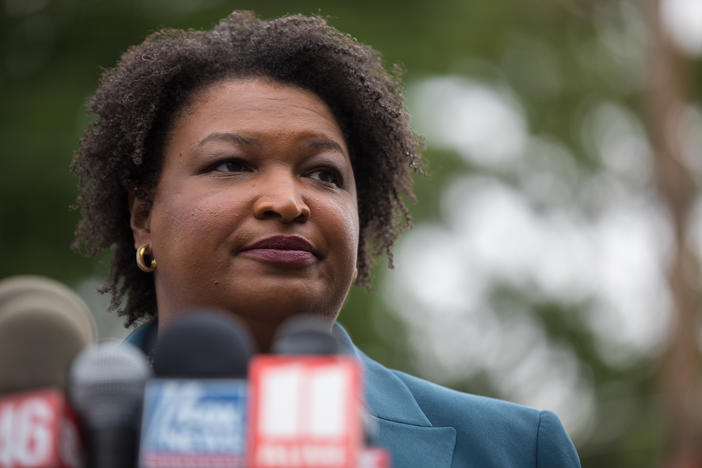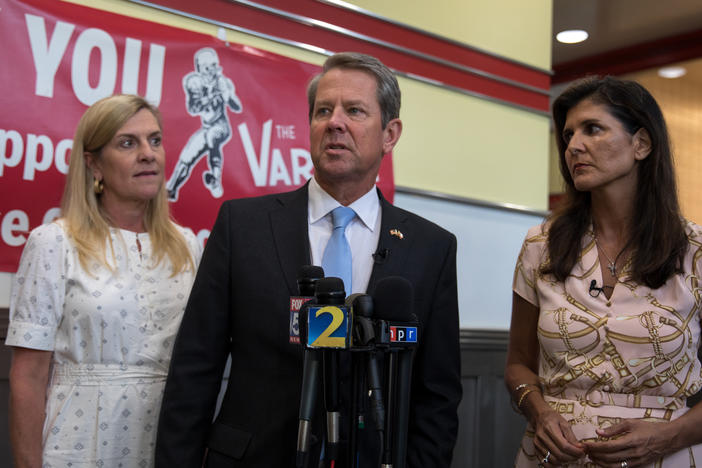GPB Remote Media
Section Branding
Header Content
Judge: Georgia Abortion law challenge will be heard before Election Day
Primary Content
LISTEN: A court will hear oral arguments in the new state constitutional challenge of Georgia’s strict abortion law later this month. At issue: whether the law violates the state constitution granting right of privacy. GPB's Riley Bunch reports.
——
A court will hear oral arguments in the new state constitutional challenge of Georgia’s strict abortion law later this month.
On Wednesday, a Fulton County judge shot down a request by the state to delay the case until after the consequential Nov. 8 midterms.
Lawyers representing the state filed a motion in September to “cancel” or “postpone” the trial, citing that holding proceedings before Election Day is “highly problematic” for state’s counsel that will likely be involved in election-related lawsuits.
Fulton County Superior Court Judge Robert McBurney denied the state’s request and said that the state’s logic was flimsy.
“The State has offered four reasons for this ‘cancellation,’” McBurney wrote. “Which can be summarized as ‘We are really busy with other things,’ ‘There are no facts in dispute,’ ‘We don’t know what facts are in dispute,’ and ‘You can’t do what you are trying to do.’”
“The Court’s response, detailed below, can be summarized as ‘Who isn’t?,’ ‘There are,’ ‘You do,’ and ‘I can,’” he wrote.
The two-day trial is set to move forward on Oct. 24 and 25 — just two weeks before Georgians cast ballots in high-stakes contests like the governor’s and U.S. Senate races.
“Delay here has a fundamentally more significant impact on the lives of many Georgians than in most other cases,” McBurney wrote.
Kara Richardson, spokeswoman for the Office of the Attorney General, said the state "respects the Judge's decision."
"We will continue to fulfill our duty to defend the laws of our state in court," she said.
The Supreme Court’s decision to overturn Roe v. Wade and leave laws on abortion-related care up to states thrust the issue into the center of statewide campaigns — particularly for Democrats who are banking on anger over Georgia’s strict law fueling high turnout of their base.
Georgia’s abortion ban, passed in 2019, was held up in court for nearly three years. A district court originally sided with plaintiffs and temporarily blocked the ban from being implemented.
But after the Supreme Court’s June decision to dissolve nearly 50 years of federal abortion protections, a federal appeals court decided the ban was lawful and signaled it would immediately take effect.
In July, opponents filed a new suit in state court, arguing that the law violates a patient’s right to privacy to make personal medical decisions in conjunction with their doctors.
It also argues that a provision that allows prosecutors to request medical records from health care providers and women who live in their jurisdiction is another infringement on privacy.
Abortion rights advocates leading the complain in court said they were pleased with McBurney’s response to the state’s request.
“We’re relieved that Gov. Kemp and his extremist allies will soon have to account in court for forcing Georgians to carry pregnancies against their will and suffer the life-altering, and sometimes life-threatening, impacts,” Monica Simpson, executive director of SisterSong Women of Color Reproductive Justice Collective, said in a statement.
“SisterSong and our partners have been in the fight against the state’s six-week abortion ban since the beginning,” she said. “And we won’t stop until every Georgian has the power over their own bodily autonomy.”
Secondary Content
Bottom Content





